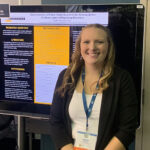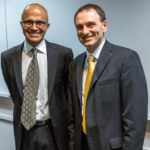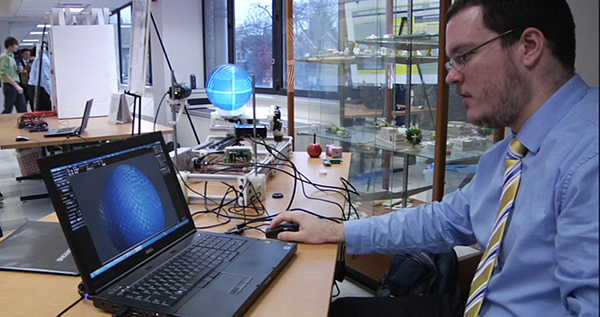
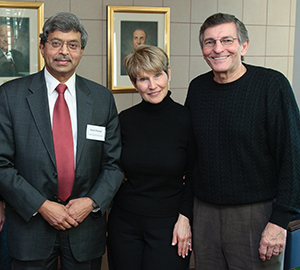
Carlton Reeves understands how successful small companies develop: They are often preceded by one or more failed attempts.
It’s all part of the process, says Reeves, a doctoral student in engineering. Just last year, he and a fellow engineering student were among the winners of the New Venture Business Plan Competition (NVBPC), hosted by the Lubar School of Business, for a mobile app they created and planned to market.
“In the end, we weren’t getting any traction with it,” he says. “I know now, but I didn’t know then, that we were not yet ready to meet with the venture capitalists.”
The beauty of business competitions, he says, is that they force applicants to go through the steps necessary to refine their plans in order to get the details right.
Now, Reeves and recent MBA grad Yusuf Dahl have joined forces to use what they’ve learned to launch a new product called Tabit, a mobile-based way for consumers to order and pay for goods at bars and restaurants.
Reeves is part of a new wave of aspiring small-business owners who get started while they are still in college. “What makes the difference in becoming an entrepreneur is your mentality,” he says. “I am not afraid to fail.”
Rewards of competing
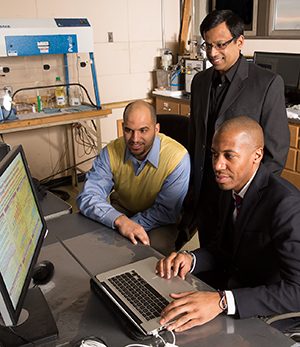
“In Wisconsin, we do well in education and in the number of patents per capita. Where we lack is in the number of startups we create,” says V. Kanti Prasad, Bostrom Professor of Entrepreneurship in the Lubar School. “The university can play a role in improving this.”
One important way the university helps budding entrepreneurs is by offering three major competitions. Funded by private donors and grants, these are opportunities to obtain hard-to-come-by, early-stage financing.
Open to students in any discipline, the NVBPC is funded by Milwaukee businessman Bill La Macchia, CEO and founder of global travel industry leader La Macchia Enterprises, who also supports an entrepreneur internship program at the school. Prasad, who directs a battery of entrepreneurial programs supported by La Macchia’s grant, also wrote the proposal that secured the grant.
This year’s top-prize winners are two engineering students, Jesse DePinto and Matthew Juranitch, and recent architecture alum Jing Bao, whose 3D scanner is made from off-the-shelf parts offering a low-cost companion to desktop 3D printers.
New Ventures Business Plan Competition winners
3D Creations:
Jesse DePinto (mechanical engineering), Matthew Juranitch (mechanical engineer), Jing Bao (alumnus)
@Home Rehab:
Xiao Bing Huang (computer science) and Hongping Zhu (business administration)
Modibook:
Jon Moze (marketing), Scott Dettman (political science)
The Portable Green Steam Team:
Zachary Meulemans (electrical engineering), Sean Nelson (marketing), Jacob Miller (supply chain operations management), Jordan Job (info tech management), Samantha Panella (marketing/finance)
Since 2008, the competition has produced at least seven small companies that are currently operating in the region.
Still going strong
“The competition can make a real difference for ventures just starting out,” says Prasad.
It did for Whitney and Julie Teska, NVBPC top winners in 2008. Freshly graduated with bachelor’s degrees in history and mass communication, respectively, they immediately invested their winnings in equipment needed to start Orchard Street Press, a sustainable screen-printing business.
“We went into the competition with the expectation that we were not going to come close to winning,” remembers Whitney Teska. “Neither of us had a business background.”
Besides the cash prizes NVBPC offers the preparation applicants need well in advance of the contest itself. Faculty and other experts give workshops, and the school’s entrepreneurs-in-residence and community businesspeople mentor teams one-on-one, and judges offer entrants critiques for improving their plans – whether or not they place.
Today the Teskas have two full-time employees; their shop has moved out of their house and into a 4,000-square-feet industrial space in the Fifth Ward. Sales last year were $300,000.
Stepping stones
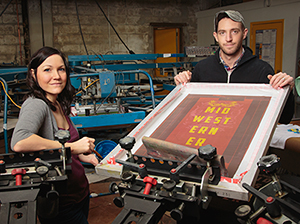
With the launch of the Student Startup Challenge (SSC) last semester, any student can become involved in entrepreneurship by simply pitching a product idea. DePinto and Juranitch were also one of the inaugural SSC winners with their concept for a scanner that could make 3D printing easier for users.
Hosted by the College of Engineering & Applied Science (CEAS), the Peck School of the Arts and the UWM Research Foundation (UWMRF), the SSC encourages interdisciplinary teams and is open to all UWM students and alums who have graduated in the last two years.
Prasad notes that UWM’s competitions serve as steps that lead teams to bigger contests offering more prize money. Every winner of Lubar’s NVBPC for the last three years, for example, has also placed in the BizStarts Collegiate Business Plan Competition.
Engineering alums Kevin Kreger and Gajanan Nagarsekar, who won the NVBPC in 2011, also placed second in the Wisconsin Governor’s Business Plan Contest in the information technology services category. Their company, Kallows Inc., makes mobile-based medical and fitness monitors. Currently, they are field-testing their product in India with backing from angel investors.
Unique learning experience
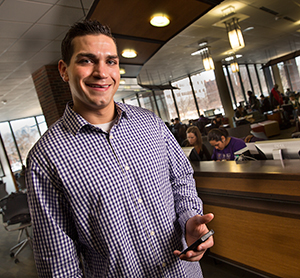
Last fall, the Lubar School launched a second business plan competition, the James D. Scheinfeld Entrepreneurial Award, which requires that at least one member of each team applying be enrolled as a business major.
The late Milwaukee entrepreneur Scheinfeld, whose father co-founded Manpower Inc., left the school an endowment that provides seed capital for student ventures. For the fall 2012 semester, four awards totaling $25,000 were made, including one to a team headed by recent finance grad Justin Nicols.
His product, called Study with Me, is an easy-to-use mobile app that allows students to help each other study wherever they may be. It offers features that go way beyond chat boards, such as push notifications and the ability to post video, photos and meet-ups with GPS directions attached.
Nicols has gotten a technical and funding partner in the Chicago-based iOS company Ora Interactive, which is looking for investment for the app from world-class venture capital groups.
“I don’t want to fail,” says Nicols, “but even if I do, I’ve got more experience on my resume because of this than a lot of business graduates.”
